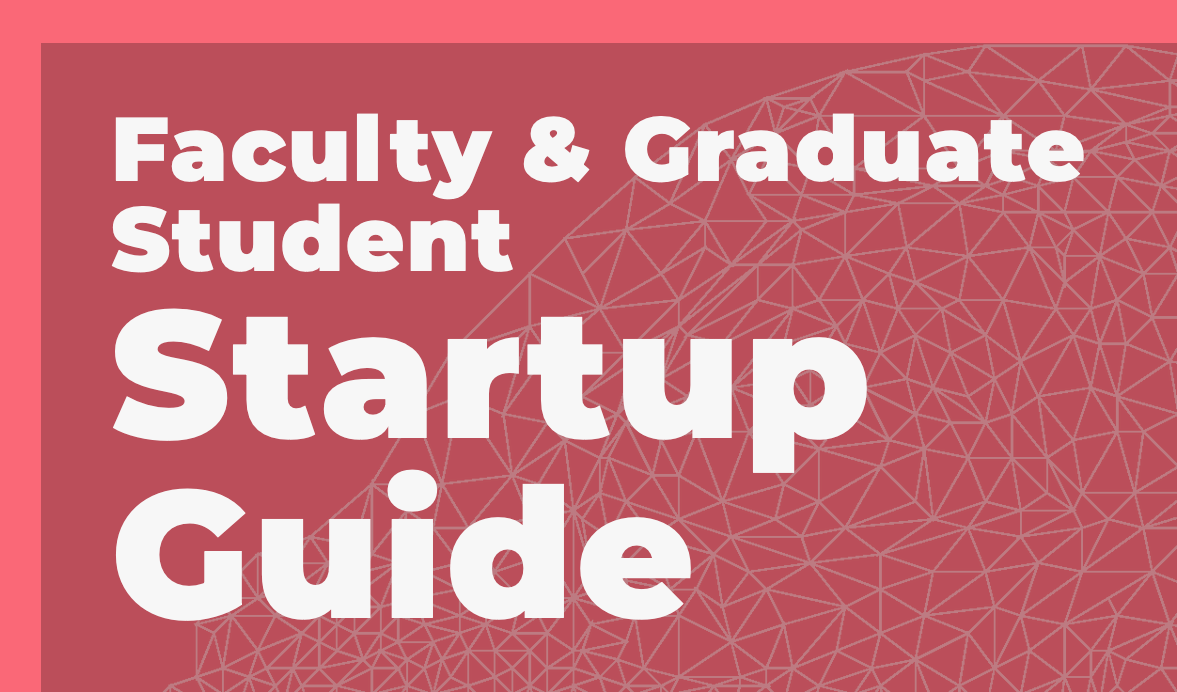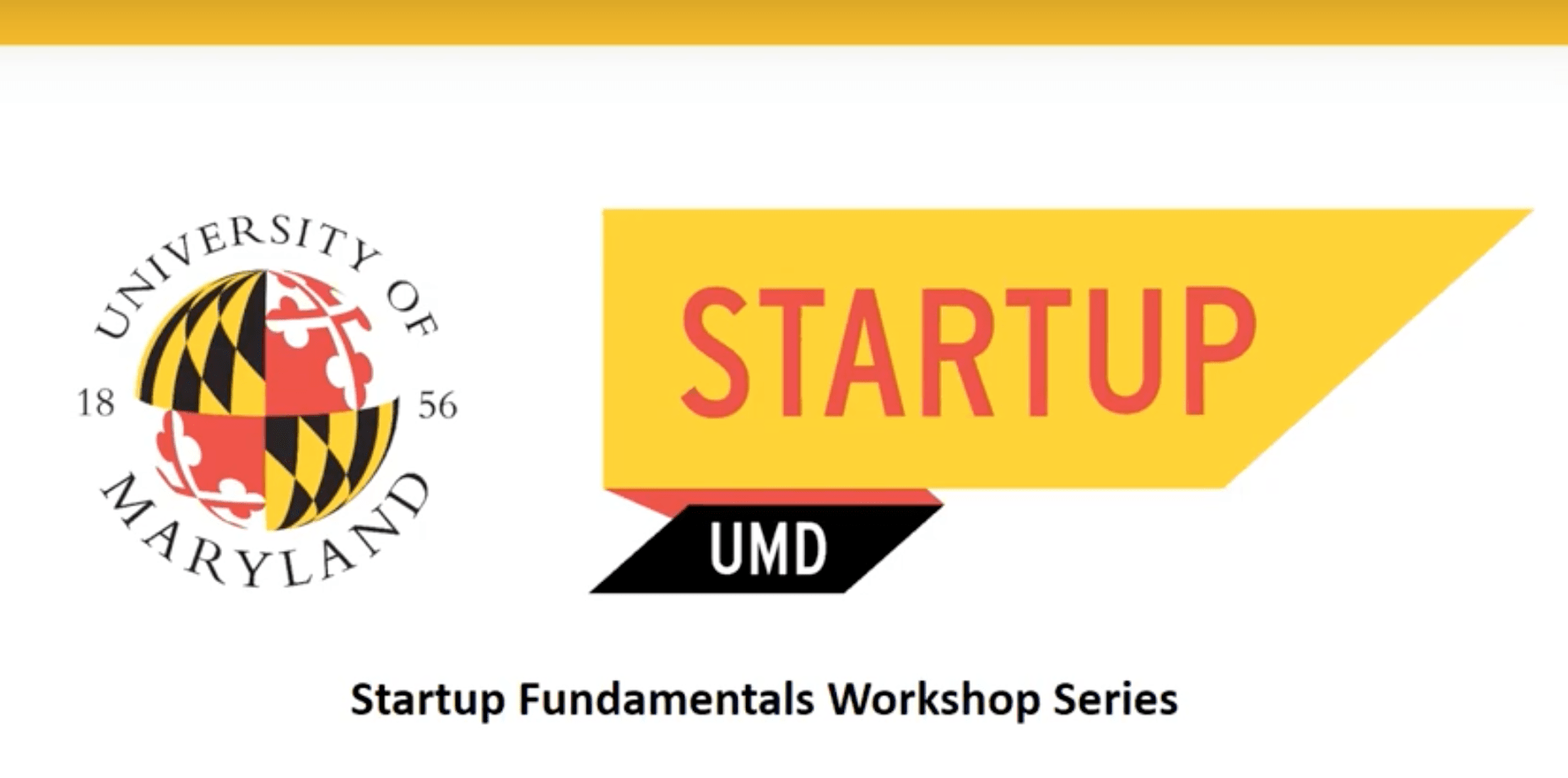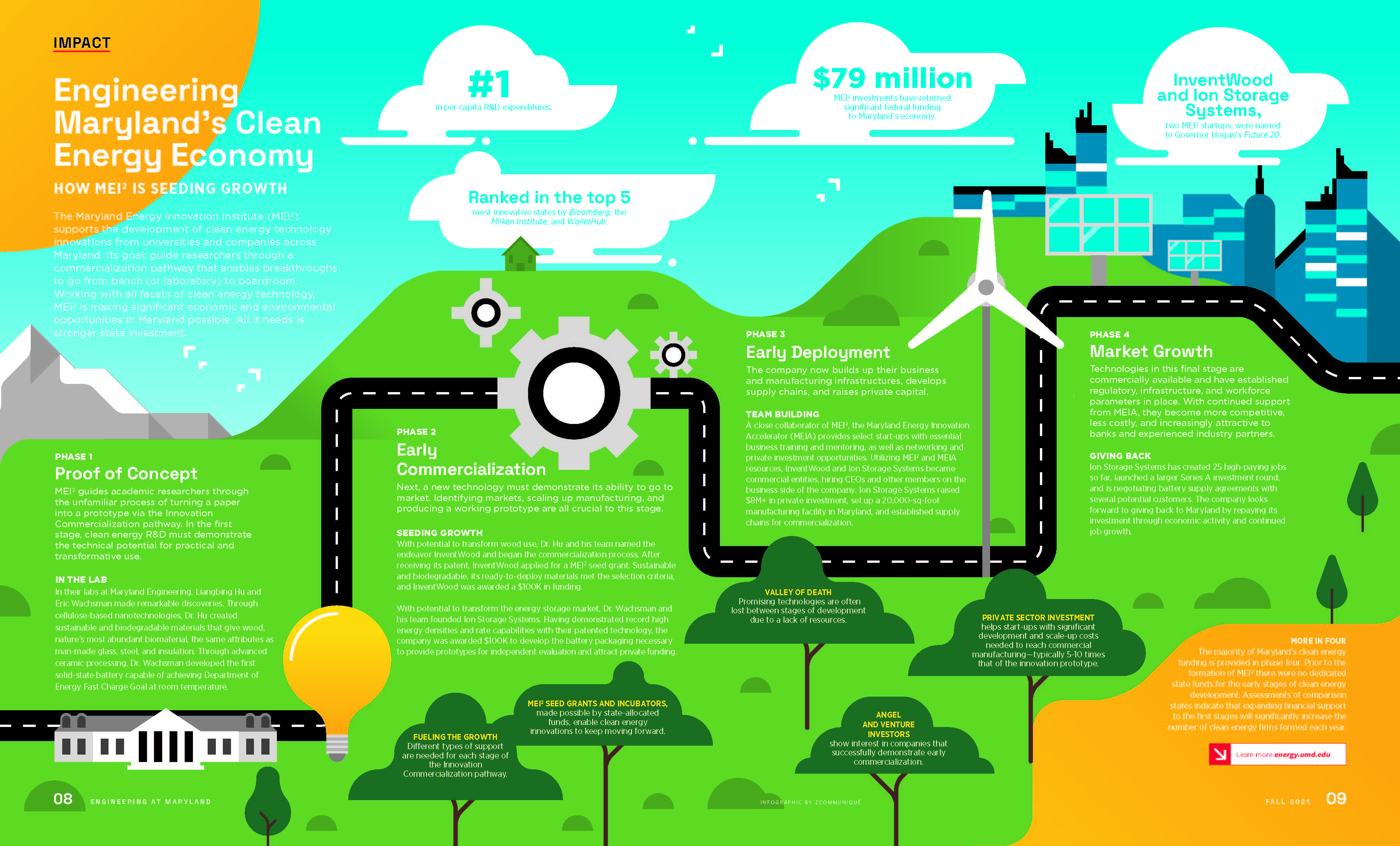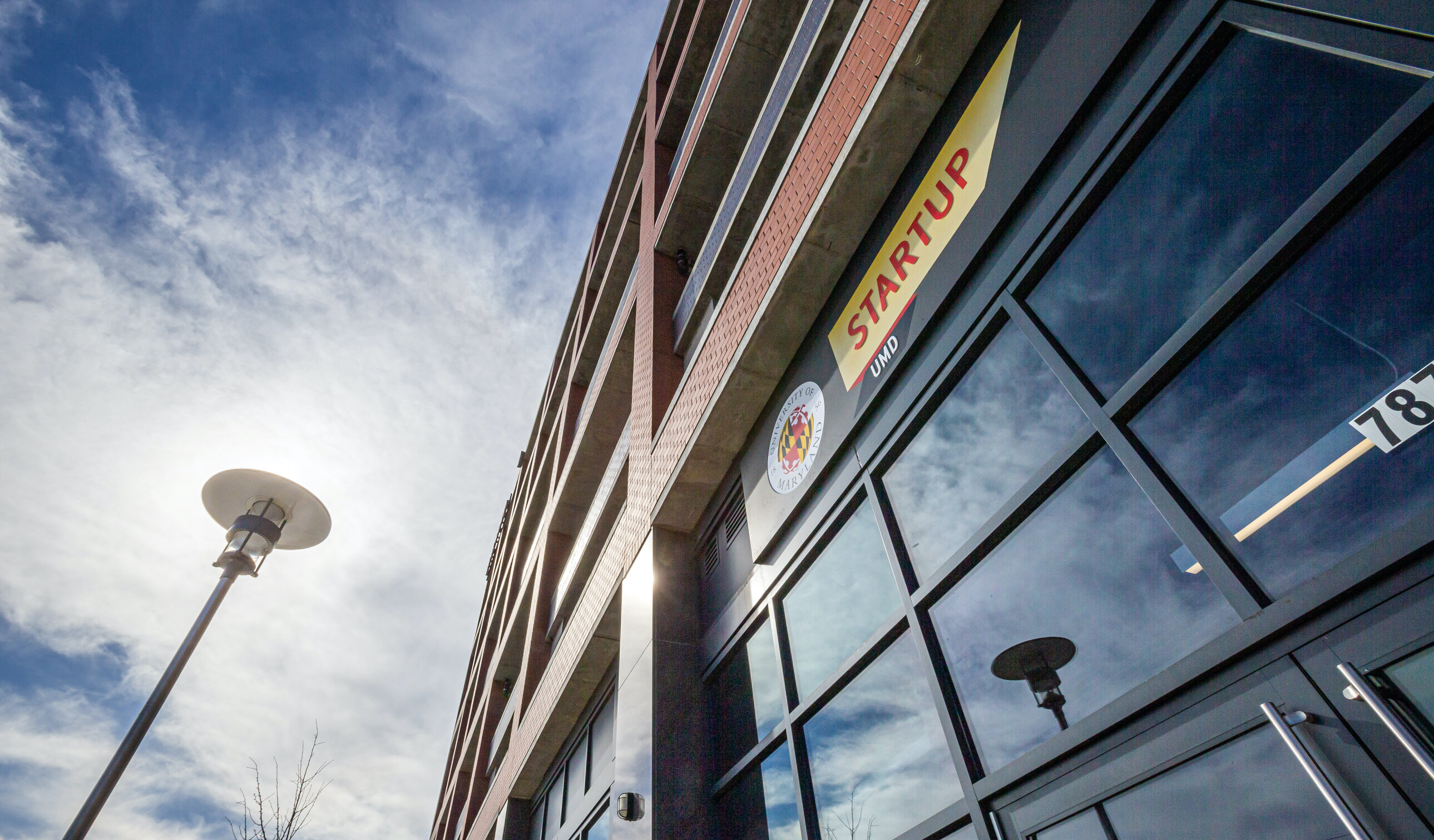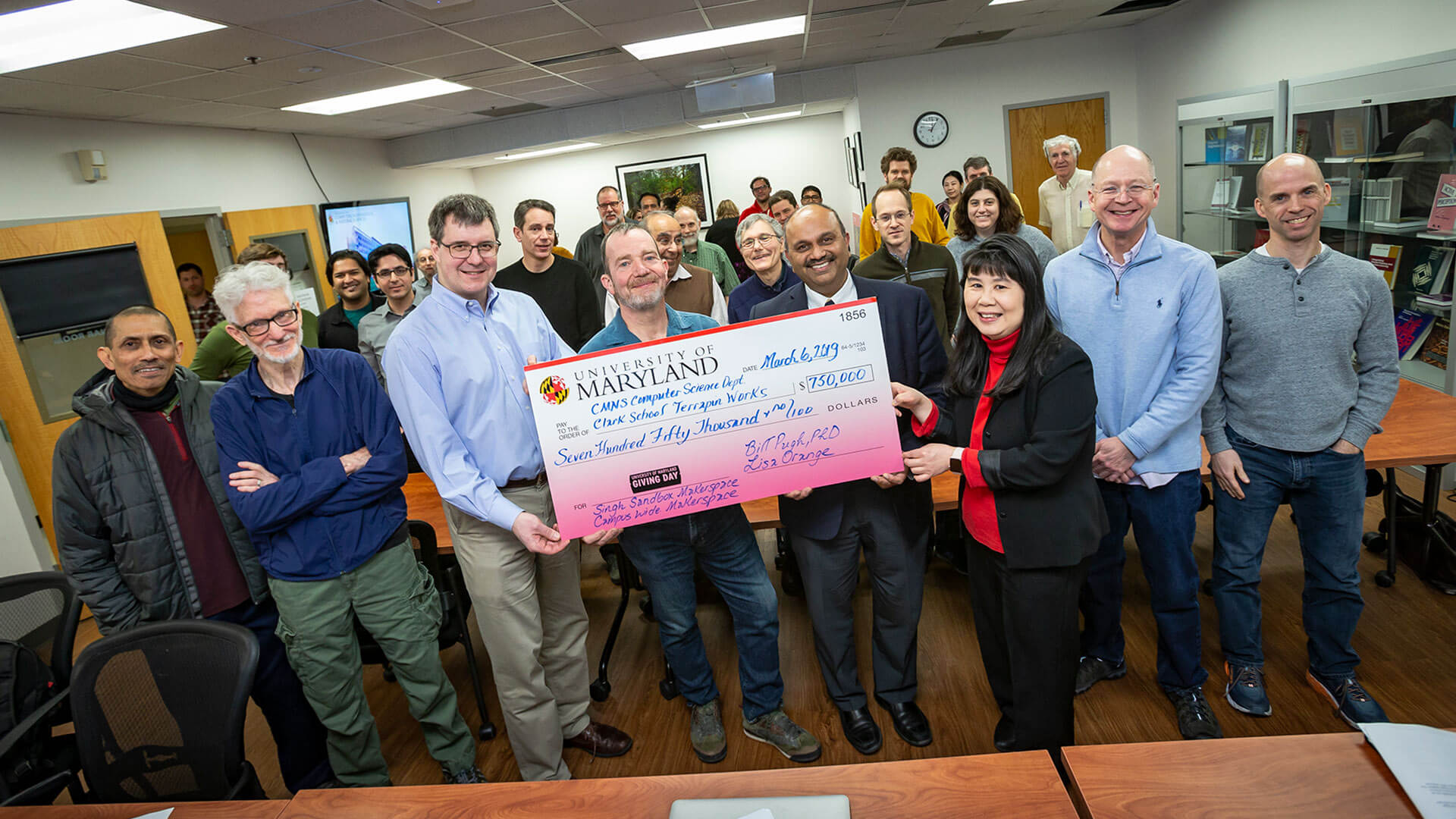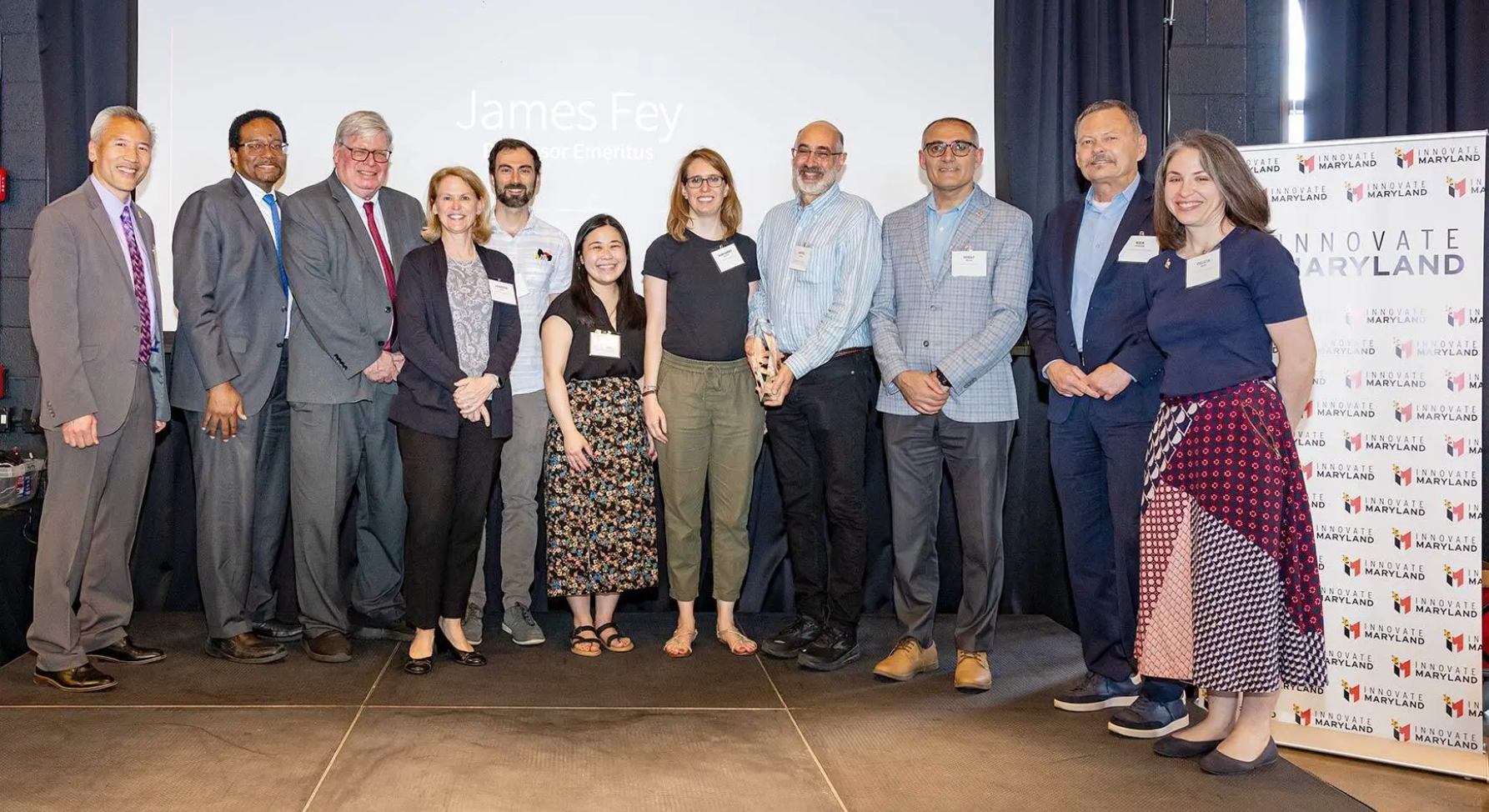
Faculty
The University of Maryland has many resources from ranging from training programs and workshops to funding dedicated to supporting all faculty, researchers, and graduate students who seek to activate their ideas into real world impact. Whether you are interested in publishing a book or patenting a novel solution, UMD offers a variety of resources in addition to customized support along your idea-to-impact journey.
Getting Started
Faculty & Graduate Student Startup Guide
If you have an invention or a great idea for a company, then utilize this interactive guide for aspiring graduate student and faculty entrepreneurs at the University of Maryland. Many startup journeys may not be as linear as the steps in this guide, so feel free to use resources from different stages in the guide based on what is useful to you.
- Feasibility Assessment - You have developed a new innovation, such as a new method, process, system, material, device, software, service, curriculum or database, or you have a great idea for a venture. What are your next steps?
- Startup Formation - Your idea has been validated. What are the next steps you should take in forming a successful venture?
- Startup Acceleration - Your early stage venture is formed. What steps should you take to accelerate it towards a sustainable company?
- Sustaining Your Venture - Your venture is successful. What steps should you take to sustain it?
Startup Fundamentals Workshops
These online sessions enable attendees to learn about a variety of skills necessary for them to transform their research and technology into impactful solutions that can benefit society. These workshops provide attendees useful information, advice, training, and even access to funding opportunities. These workshops provide attendees useful information, advice, training, and even access to funding opportunities.
- Most workshops are hosted virtually via Zoom and many (but not all) are recorded and are available on the StartupUMD YouTube Channel.
- Subscribe to the mail list to receive announcements about upcoming workshops, events, funding opportunities, and other news of interest to entrepreneurial faculty.
UMD I-Corps
Provides real world training on how to incorporate innovations into commercially viable companies to solve societal problems. The curriculum is based on the Lean Startup framework, through which researchers can better understand the market potential of an innovation.
Do you have an innovation that you think could be the basis for a successful business? Not sure how to figure that out? You're not alone!
Want to increase your chances of success? UMD's I-Corps program offers a short, two-part course that teaches you proven, evidence-based methods to becoming a successful entrepreneur. You'll learn the essence of the highly regarded "lean startup" method, including how to build a viable business model and how to discover whether there are customers who value your innovation.
- NO COST: The Introduction to I-Corps Courses at UMD are free to all participants. Teams that complete this regional program and proceed to NSF’s national I-Corps Teams programs are potentially eligible to receive $50,000 non-dilutive grants.
- Format: Your learning begins with the self-paced I-Corps Prep, which includes videos, quizzes, and assignments to help you frame your entrepreneurship journey and customer discovery. This asynchronous course takes only a few hours of work.
- Course Content: The self-paced I-Corps Prep mini course will introduce you to the concepts of business model generation and the process of customer discovery. The instructor-led seminar will help you begin to put into practice the concepts you learned in the I-Corps Prep. The program will give you the tools to begin to determine whether your innovation, in its current stage, has value to a customer segment, in other words, whether there is a “product - market fit.”
- Eligibility: All UMD professors, research staff, postdocs, graduate students, and undergraduate students with potentially commercializable research or technology-based business ideas are eligible and encouraged to enroll. UMD also welcomes researchers and entrepreneurs from the University System of Maryland and from the broader state to apply to the program. While individuals may certainly apply to the course, participants are strongly encouraged to apply as a team of at least two members, and to apply with an industry mentor to support you in the program.
- Timing: You may begin the self-paced I-Corps Prep, anytime, by enrolling here. UMD offers the live, instructor-led Mid-Atlantic I-Corps Workshops several times each year. Click here for a list of upcoming workshops at UMD. (You may only join these cohorts with instructor approval after you have completed the I-Corps Prep.)
Campus Resources
Academy for Innovation & Entrepreneurship
The Academy engages people in design and innovation to build their capacity as innovators and creative problem solvers in their field. The Academy's work is grounded in design tools and methods to create engaging courses and programs, collaborative workshops, and meaningful partnerships that cultivate creativity, critical thinking, and innovation and entrepreneurship skills. Among the offerings and programs provided by the Academy for Faculty, Staff, and Graduate Students include:
- Innovation Fellowship - Graduate students and staff from any unit or department at the University of Maryland can join the semester-long Innovation Fellows program to learn innovation mindsets, tools, and processes that are relevant to their professional, academic, and personal lives.
- Innovation Tools & Mindset Training - Experience different innovation tools and mindsets through our asynchronous training, which is available to the UMD community through the Open Learning platform. Explore different “Big Ideas” related to innovation through highly experiential and hands-on activities. This training is asynchronous, which means you can access the training materials on your own schedule and at your own pace. The training takes about 14 hours, estimating 1 hour per module.
- Teaching & Learning Studio (TLS) is a week-long in-person workshop for university educators taking place at Stanford’s d.school, designed and facilitated in collaboration with the Academy for Innovation & Entrepreneurship.
- Teaching Tools - Embrace a "yes, let's!" and an experimenter's mindset and try out different tools and methods for yourself. Check out the teaching resources we have below.
- Try It Now! - Want to bring your idea to life? Then build your innovation skills and mindsets by doing some of the interactive activities included on this page.
Arts for All
The Arts for All initiative partners the arts with the sciences, technology and other disciplines to develop new and reimagined curricular and experiential offerings that nurture different ways of thinking to spark dialogue, understanding, problem solving and action. It bolsters a campus-wide culture of creativity and innovation, making Maryland a national leader in leveraging the combined power of the arts, technology and social justice to collaboratively address grand challenges.
Maryland Center for Humanities Research
The Center supports the research goals of the College of Arts and Humanities, which are to: maintain and strengthen excellence in our research; increase the value and impact of our research among UMD leadership and other campus stakeholders; build a research portfolio that reflects ARHU’s mission of diversity and inclusion; and enhance and promote the social value of research in the arts and humanities. The mission of the Maryland Center for Humanities Research is to promote and support diverse forms of inquiry and engage stakeholders in innovative and inclusive approaches to understanding the value of the humanities for improving our lives.
Maryland Energy Innovation Institute (MEI2)
The MEI2 at the University of Maryland's A. James Clark School of Engineering was founded to support the development of clean-energy technology innovations from companies and universities across Maryland, thereby boosting economic growth and jobs in the state’s clean-energy sector. It's mission is to catalyze clean energy technology to address climate change, stimulate economic growth, and create a sustainable future.
The institute supports entrepreneurial engineers and scientists working on technologies poised to revolutionize the energy industry. From groundbreaking energy research, to seed grants that enable demonstration of the technology in working prototypes, to accelerator programs that prepare fledgling companies for the crucible of the open market, MEI2 offers a range of clean energy business development opportunities.
MEI2 provides a platform to catalyze basic research into new technology while stimulating economic growth and improving millions of lives across the state of Maryland. The Institute brings together science, industry, government and economic leaders to develop solutions to global and local energy problems and facilitate the transfer of technology and resources to the public in addition to transitioning the research into marketable products and services through locally based entrepreneurial ventures.
Mtech
Maryland Technology Enterprise Institute (Mtech) is a unit of the A. James Clark School of Engineering at the University of Maryland that guides aspiring and existing entrepreneurs through the entire lifecycle of launching and maintaining technology-based ventures, and they support technology product development partnerships in both fledgling and mature ventures. There are a number of resources and services provided by Mtech for students and faculty.
UM Ventures College Park
UM Ventures supports and promotes innovative solutions and emerging ventures by providing legal assistance, business expertise, technical know-how, and more.
- Faculty Startup Program provides a general outline for designing a path to success specific to your needs.
- Startup Process Concierge - The UM Ventures College Park team's goal is to empower UMD faculty and graduate students to transform their research into successful startups by providing resources and customized guidance through rich entrepreneurship ecosystem at the University of Maryland and the State of Maryland.
Virtual Business Information Center (VBIC)
The VBIC is collection of major commercial full text databases as well as internet websites specifically curated for their unbiased, fact-based authoritative business content thanks to a partnership between the College of Information Studies, the Robert H. Smith School of Business and the University of Maryland Libraries.
VBIC includes commercial fee-based databases as well as carefully evaluated free internet resources. It is designed to guide users to efficiently find information on some of the key business areas essential to analyze when starting a business: the industry, the competition, the customer.
Each of the broad research business topics are linked to databases listed in hierarchical order of their importance to that topic. Reliable answers to inquiries dealing with: industry market size, industry trends, major competitors, consumer purchasing habits, and much more are quickly and efficiently generated.
Startup Facilities & Spaces
Accelerators
- Maryland Energy Innovation Accelerator (MEIA) focuses on early-stage technology commercialization in partnership with Maryland-based Universities and Labs to support Maryland's Clean Energy and Climate Goals. MEIA supports solar, wind, batteries, energy efficiency, grid modernization, carbon capture utilization and storage (CCUS), and any other technology that reduces greenhouse gas emissions or provides negative emissions benefits in the electric, oil and gas, residential, commercial or industrial sectors.
Incubators
- Mtech Ventures is a University of Maryland incubator for technology-based innovations commercialized at the university. Mtech Ventures helps early-stage startups survive the critical period in their development between conducting customer discovery and raising their first round of venture capital. The Mtech Ventures facility offers affordable space and hands-on mentoring for early stage companies. Companies involved in the program also benefit from the extensive facilities and services available from the University System of Maryland, one of the country’s largest public research and teaching systems.
- Quantum Startup Foundry brings together the physical and virtual resources needed to support entrepreneurs, startups, and established businesses in accelerating quantum technologies’ time to market.
Makerspaces
- Makerspace Initiative - The Makerspace Initiative (MSI) is a consortium of 25+ makerspaces from different departments and units across campus, with the common goal of helping each other provide the best experience possible for students, faculty, and staff.
- Terrapin Works provides rapid prototyping, advanced manufacturing, and digital design resources as a service to the campus and surrounding community. These resources range from 100+ consumer, research and industrial grade 3D printers, to high end subtractive production systems capable of creating complex parts in a variety of materials.
Discovery District
This dynamic research park brings together a vibrant and inclusive community of university stakeholders, corporate partners, government researchers, entrepreneurs, and local residents. It is the University's hub for activating fearless ideas for transformational impact by fostering research and industry partnerships, supporting small businesses, and nurturing the growth of next generation technology ventures.
The Discovery District offers a variety of services and spaces that support founders and startups including:
Spaces
- Co-Working Space - UMD has partnered with global coworking company WeWork to develop WeWork University of Maryland. This Discovery District location is the first WeWork in the state of Maryland, as well as the first on a college campus. The coworking model is a great space solution for startup companies who are just getting off the ground, as well as larger companies who may want to open a location to test out the market surrounding UMD. WeWork UMD offers memberships for drop in “hot desks” as well as secure private offices at flexible lease terms.
- Flex R&D Space - Many of the companies emerging out of the University and in the region are makers – they develop and produce products that often require unique systems and spaces. The University of Maryland’s partnership with St. John Properties (SJPI) has yielded 110,000 SF of flex/R&D buildings, perfect for ventures that require high ceilings, delivery bays, and complex electrical or HVAC systems.
- Traditional Office Space - UMD has partnerships with a variety of landlords and development companies to bring leasable office space to the market within the Discovery District. The University of Maryland itself is not the leasing agent for any of these properties, and exact availability of space within each building may vary. Learn more about the different office space options by viewing the various office space options.
Services
- Maryland APEX Accelerator provides small business counseling to Maryland-based small businesses in the Government Contracting arena at NO cost.
- Maryland Small Business Development Center (SBDC) offers FREE individualized consulting, from start up to established businesses. Maryland SBDC also offers comprehensive training programs, from those just thinking about starting a business to executive training, with most classes at low to no cost. The Maryland SBDC Network provides Maryland small business owners with access to trusted business advisors who have experience in starting and growing businesses.
- Maryland Business Opportunity Center (MBOC) is a central hub to cultivate and support efforts to start, grow, and sustain entrepreneurship in underserved communities through awareness and access to entrepreneurship programs.
- Startup UMD - Located within the Diamondback Garage, this suite serves as an innovation and entrepreneurship hub that houses the Office of Innovation along with the Terrapin Development Company, the Do Good Accelerator, and the Adobe Research Lab. It operates as an initial touch point for anyone interested in engaging the university's innovation and entrepreneurship ecosystem.
- Mid-Atlantic Veterans Business Outreach Center (VBOC) program is a one-stop shop for transitioning service members, veterans, and military spouses looking to start, purchase or grow a business. Training opportunities, counseling and mentoring in-person and online, referrals to partners and programs, and most networking events are available at no cost to veterans.
Funding
Fellowships
- Academy for Innovation & Entrepreneurship Innovation Fellowship - Graduate students and Staff from any unit or department at the University of Maryland can join the semester-long Innovation Fellows program to learn innovation mindsets, tools, and processes that are relevant to their professional, academic, and personal lives.
- Arts for All Faculty and Graduate Student Fellowships - These fellowships support publicly-engaged research activities.
- Faculty Fellows will receive $10,000.
- Graduate Student Fellows will receive $2,500.
- Center for Social Value Creation Impact Consulting Fellowship (ICF) is one of CSVC’s most esteemed programs. This unique program gives students of all levels at UMD the opportunity to provide hands-on, pro-bono consulting work within a team for B-Corporations, non-profit organizations, and for-profit impact-driven organizations in various industries.
- Hulka Fellowship - Since 2008, Ms. Barbara Hulka has provided the Hulka Energy Research Fellowship to support graduate student research in selected alternative energy fields at the University of Maryland Energy Innovation Institute.
- Wells Fellowship - University of Maryland Energy Innovation Institute is privileged to offer the Harry K. Wells Fellowship. Mr. Harry K. Wells established an endowment to support engineering graduate student research in energy at the UMD. This announcement serves as a request for proposals for engineering graduate student(s) and their faculty advisor(s) to seek funding to pursue new research in the field of sustainable energy generation and/or storage.
Grants
- Arts for All ArtsAMPlification Grants are for faculty and students to fund a variety of activities. Arts for All is a campus-wide initiative that seeks to:
- 1) make the arts at the University of Maryland increasingly accessible to—and representative of—all students,
- 2) connect the arts to technology and other disciplines, especially the sciences, and
- 3) ensure that the arts are meaningfully engaged with issues of social justice and the grand challenges of our time. Proposals that center these priorities have the highest chance of success.
Funds
- Do Good Campus Fund supports the substantial efforts happening across University of Maryland, aimed at reimagining learning and serving humanity both inside and outside the classroom.
- Kirwan Faculty Research and Scholarship Prize - Former University of Maryland President William E. Kirwan and Patricia Kirwan generously established a fund to support the Kirwan Faculty Research and Scholarship Prize. This annual prize recognizes a faculty member for a highly significant work of research, scholarship, or artistic creativity completed in the recent past. The prize is awarded for a specific activity such as a publication, an invention, a performance, or any other activity within the faculty member’s academic discipline. The prize carries an honorarium of $5,000 and is awarded at the Fall Convocation. All current full-time tenure-track or tenured faculty are eligible.
- Maryland Catalyst Fund program is the UMD’s internal faculty research support program and a key resource in the university’s overall effort to expand its research activity, visibility and impact. The program is designed to enable innovative research, incentivize the pursuit of large, complex, and high-impact research initiatives, and help UMD faculty to be more competitive for extramural research awards.
- UM Ventures Medical Device Development Fund provides $50,000 in research funding for up to nine-month-long projects (no F&A charged) for medical device prototype development and is open to University of Maryland, College Park researchers. The goal of the program is to fund further development of university-owned intellectual property and facilitate technology transfer.
- UMD Libraries' Open Access Publishing Fund improves access to research produced at the University of Maryland:
- enables authors to retain their copyrights
- accelerates the online availability of peer-reviewed scholarly journal articles generated by UMD researchers
- raises campus awareness about the benefits of open access
- covers article processing charges (APCs) levied by peer-reviewed open access journals
Angel Investors
- Dingman Center Angels (DCA) is a Maryland based angel investment group that provides funding to early-stage companies primarily located in the mid-Atlantic region. Our members are entrepreneurs, CXO's, venture capitalists and business leaders who have founded, funded and built world-class companies. Investors come from a variety of industries, have diverse investment experience and expertise; and, in association with the Dingman Center for Entrepreneurship, help foster a vibrant local early-stage venture investment community.
Early Stage and Seed Funding
- Chesapeake Bay Seed Capital Fund is an early-stage investment fund that supports seed-stage technology startups developing technologies that aid in the restoration of the Chesapeake Bay.
- Discovery Fund is an early-stage investment fund formed to encourage the development and location of University of Maryland created or sponsored technology companies in Prince George’s County, Maryland.
- Maryland Industrial Partnerships (MIPS)
- Maryland Momentum Fund - A pre-seed to late-seed stage investment fund, the Maryland Momentum Fund helps promising early-stage companies bridge from grant funding and angel investment to a Series A round of investment.
- Maryland Industrial Partnerships (MIPS) program provides funding, matched by participating companies, for university-based research projects that help the companies develop new products.
- TEDCO Maryland Innovation Initiative (MII) was created to foster the transition of promising technologies having significant commercial potential from Qualifying Universities, where they were discovered, to the commercial sector, where they can be developed into products and services that meet identified market needs. Specifically, it is the intent of the program to foster the commercialization of such technologies through technology validation, market assessment, and the creation of start-up companies in Maryland based on a technology from a Qualified University (a University Start-up), and to accomplish this through collaborations between various schools, departments, and institutions within and among the Qualifying Universities and among other research organizations in the State.
- UMD Sustainability Grants - Any student, faculty, or staff at UMD can receive funding for initiatives and projects that benefit sustainability! Approximately $665,000 is available each fiscal year in the Sustainability Fund, so consider any ideas or initiatives you'd like to propose.
- USM Early Launch Fund is flexible early-stage capital, primarily in the form of non-dilutive grants, ranges from less than $2,000 to $50,000. This capital is designed to bridge foundational gaps, supporting USM students, faculty, and alumni entrepreneurs on their journey to the next steps.
Fellowships
- NSF Entrepreneurial Fellowship - Through this fellowship, Activate Fellows develop research breakthroughs into new products and services with broad societal and economic benefits. Fellows receive at least $350,000 in direct support over two years, including a stipend, travel allowance, research funding and additional flexible capital. In addition to mentorship and funding, fellows gain access to vital research tools, equipment, facilities and expertise through collaboration with host laboratories.
Technology Translation & Research Partnership Funding
- National I-Corps Training Program - A team accepted into the U.S. National Science Foundation’s Innovation Corps (I-Corps™) National Teams training program is eligible to be awarded up to $50,000, which supports the team’s program participation including stipends and expenses for virtual and in-person customer discovery.
- Partnerships for Innovation (PFI) program gives scientists and engineers the opportunity to increase the impact of their NSF-funded research discoveries by developing their technology into a prototype or proof of concept. PFI accepts proposals in two broad tracks:
- Technology Translation: Supports commercial potential demonstration projects for academic research outputs in any science and engineering discipline. This demonstration is achieved through concept, prototyping, technology development and scale-up work. PFI Technology Translation projects are funded at up to $550,000 for up to two years.
- Research Partnerships: Supports complex, multifaceted technology development projects that are typically beyond the scope of a single researcher or institution, and requires a multi-organizational, interdisciplinary, synergistic collaboration. PFI Research Partnerships projects are funded at up to $1 million for three years.
Faculty Creators, Founders, and Innovators
Creators
- James Fey, professor emeritus in the College of Education’s Center for Math Education, co-authored a series of children’s mathematics workbooks and curricula that have generated $4.1 million in revenue for UMD since 1991. Fey donated his share of the royalties back to the department to fund over a dozen PhD students in the Fey-Graeber Fellowship program.
Founders
- Chris Monroe, Principal Investigator, former University of Maryland Department of Physics, Joint Quantum Institute, and Center for Quantum Information and Computer Science, co-founded IonQ.
Innovators
- Rita Colwell, Distinguished University Professor, developed computational and satellite-based approaches to track and predict disease outbreaks after making fundamental discoveries about how cholera spreads. Her latest work is leading advances in molecular diagnostics of human pathogens and antimicrobial resistance.
Inventors
- Liangbing Hu, former director of the Center for Materials Innovation, patented super strong and durable wood structure.
- Jimmy H. C. Lin is most well known for his invention of the lateral transistor that is used in most linear integrated circuits and digital integrated circuits. His early study of the temperature effects led to the use of diode compensation configuration, which is now widely used in transistor amplifiers. It is a little known fact that the output (or Totem) driver used to control the speakers in every audio system was invented by Professor Lin.
- Ray Liu, a Distinguished University Professor of electrical and computer engineering, honored for work in wireless AI technology that has revolutionized wireless communications.
- Laurie E. Locascio, former vice president for research, holds 12 patents as a biomedical researcher and now oversees NIST.
- Ben Shneiderman, Computer Science Professor Emeritus, invented the concept of internet text itself serving as a link to other webpages or websites—the genesis of the now-ubiquitous hyperlink.
- Joseph Weber, the late physics professor, co-invented the maser (which led to the laser—a related device using optical light); he’s better remembered as the father of gravitational wave detection. The massive devices he invented to measure these ripples in spacetime did not succeed, but technology inspired by his work in 2015 detected the merger of two neutron stars a billion light years away.
Read about Impact-Focused Faculty
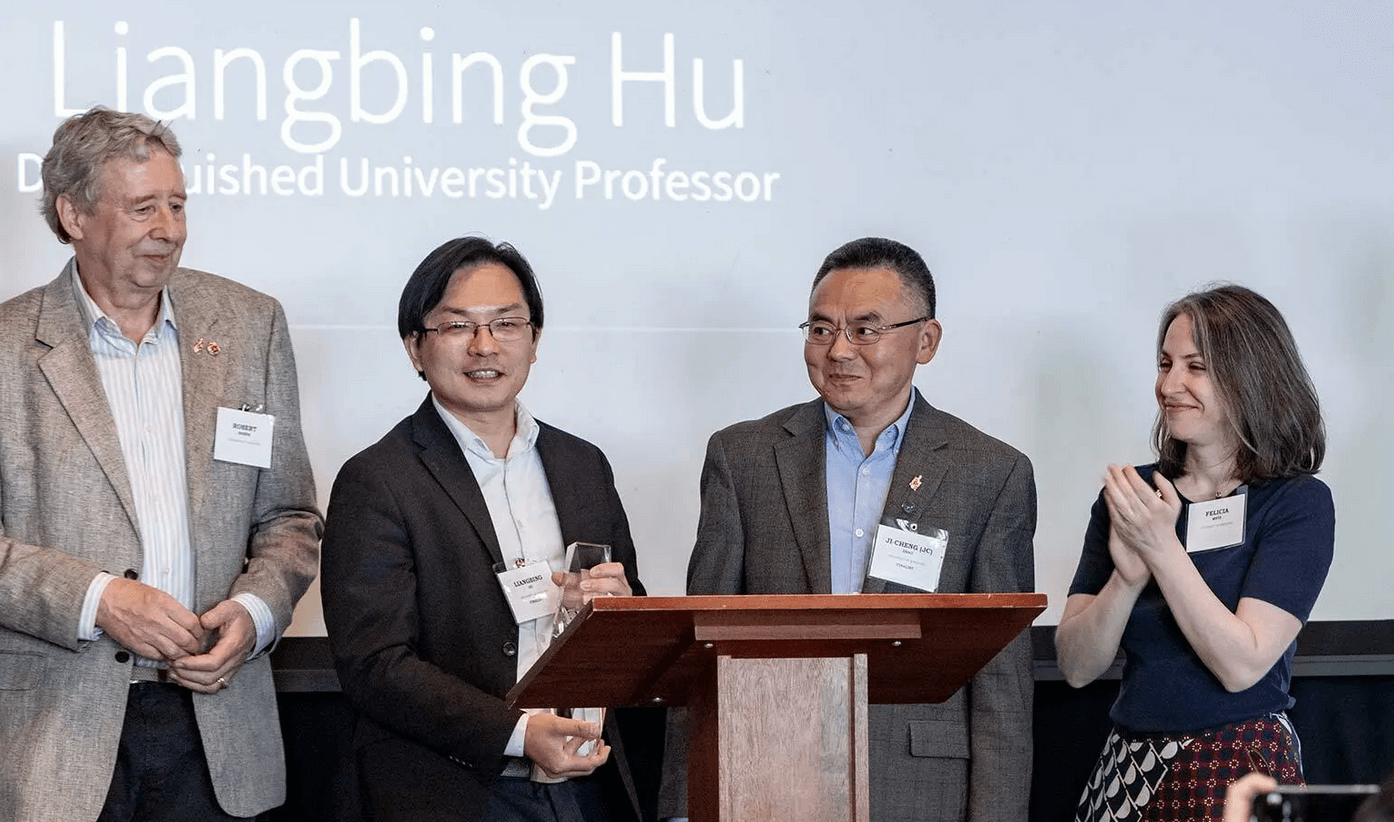
Groundbreaking Plasma Innovation Shines as Top Invention of the Year
Distinguished University Professor Liangbing Hu (second from left) is honored at the Innovate Maryland Invention of the Year award event.
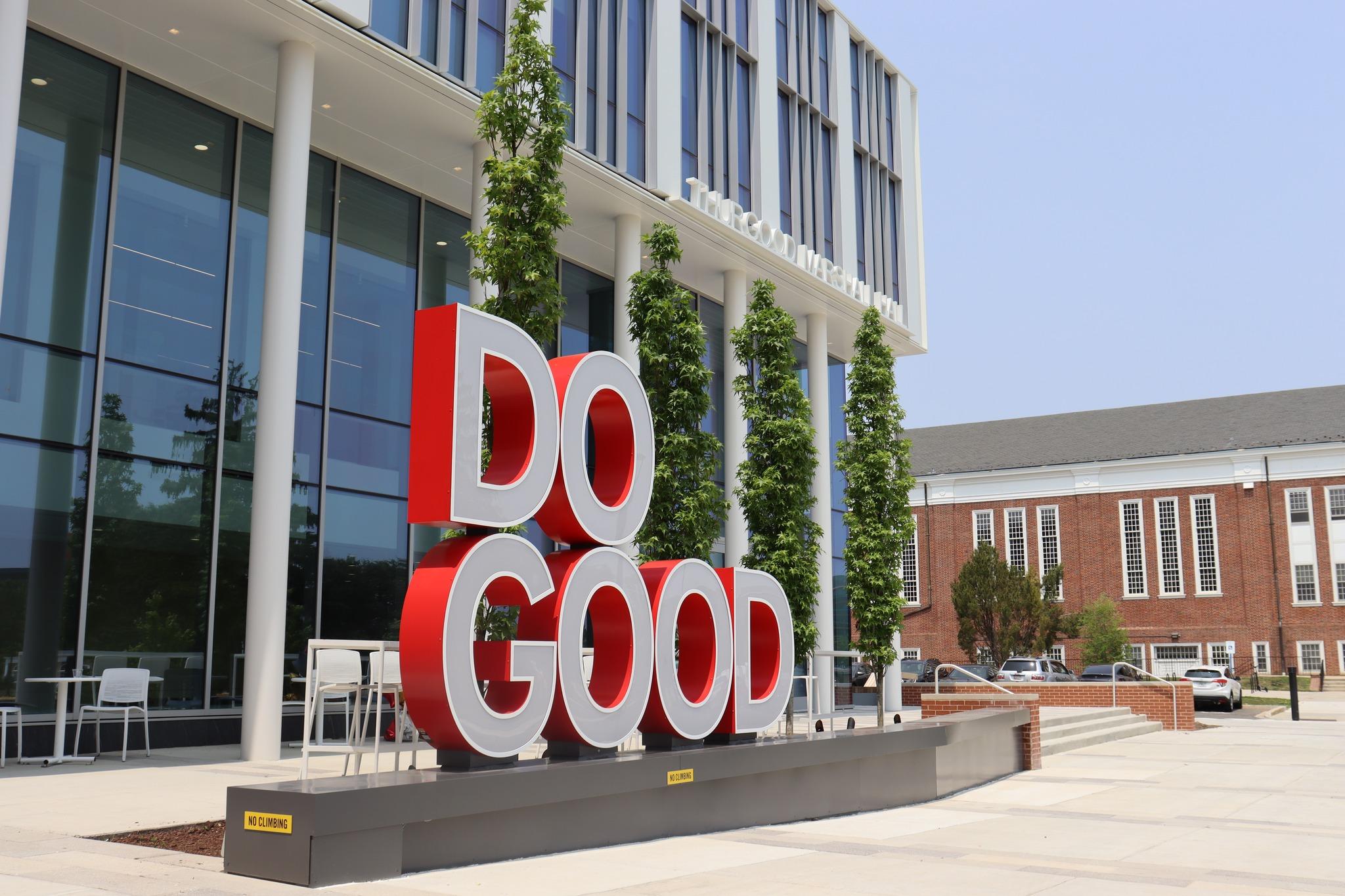
57 Faculty, Staff Named Inaugural Do Good Innovators
This past fall, we announced several new Do Good investments to expand our university's leadership and impact to advance the public good. Among them is the Provost’s Do Good Innovator Awards, which celebrate the social impact already being made by faculty and staff across campus.
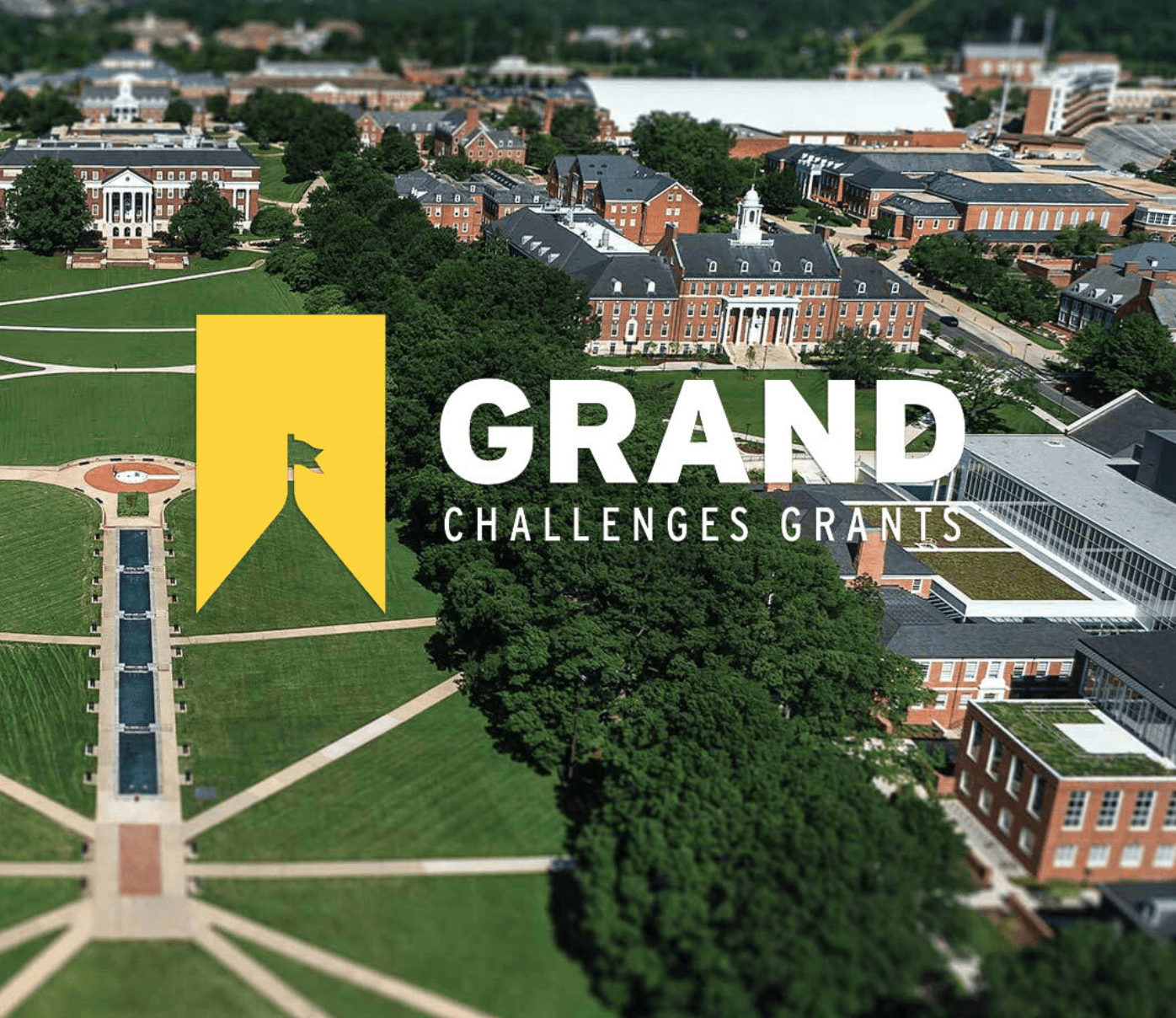
Grand Challenges Grants Awarded to Faculty Tackling Society's Most Pressing Needs
Unprecedented UMD grants program aims to tackle society’s most pressing problems with $30 million to support research into topics including pandemics, racism, threats to democracy and literacy deficits.


